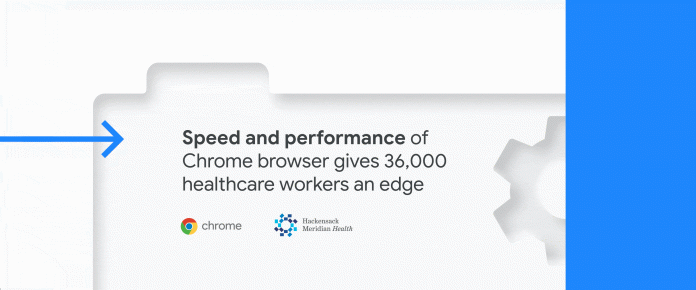Editor’s note: Today’s post is by Mark Eimer, CTO at Hackensack Meridian Health (HMH), a New Jersey network of 17 hospitals with 36,000 employees. Hackensack Meridian Health adopted Chrome browser to support employees’ access to apps and content, no matter where they’re working. To date, HMH is managing 60,000 Chrome browser installs across 500 locations. From this successful beginning, HMH has moved along farther on its Chrome journey, standardizing on Chrome OS, Citrix, and Workspace.
Every day, the HMH IT team has one goal: Total readiness for every patient who comes through the door. That goal has become even more important during the pandemic era, but with the very best staff assisted by technology, we’ve continued to be at the forefront of saving lives. We never want a patient to be turned away or rescheduled because of an IT issue. With Chrome browser as the starting point for HMH’s clinicians and administrative staff using healthcare applications, we’ve created a reliable work environment that enables clinicians to focus on care.
Starting with a better browser experience
Our previous browser was slow, outdated, and required a good deal of troubleshooting from IT when employees had problems. Most of the time, we’d just tell people to switch to Chrome browser, and the problem would go away. After a while of steering people toward Chrome, we thought, why don’t we just switch to Chrome as our standard browser? With Chrome, apps loaded instantly, which meant clinicians could provide better patient care. Speed and performance matters greatly in healthcare technology, and clearly, Chrome gave us this edge. As a matter of fact, support requests dropped by about 25% once we standardized on Chrome browser.
Choosing Chrome as our default browser was an easy decision. We’ve already partnered with Google in many other ways: We have thousands of Chromebooks, rely on Chrome OS for manageability and security, and have standardized on Google Workspace as our productivity solution. Employees can even securely access applications such as Epic, our electronic medical record system, through Citrix Workspace on their Chrome OS device. Everything works perfectly together, and the end result is that a doctor or nurse in an HMH hospital or examination room is not going to be held back or delayed by slow, clunky tech.
A unified management solution with Chrome browser
Chrome is on all 60,000 of our devices. That’s a lot of browsers to manage, especially at a time when many of our employees are still working at home, or moving between home and the office. Two solutions from Chrome make it much easier.
With Chrome Browser Cloud Management, we get central management that’s so easy, we don’t have to think much about it. We have 500 locations and 60,000 devices using Chrome browser, so being able to manage every browser in one place, regardless of device, is huge. When we eventually add more Chrome devices OS devices across our network, I expect to see a 50% reduction in support tickets.
And with Legacy Browser Support, we can speed app access to every HMH employee, even for those apps that require a legacy browser. In the healthcare industry, there are many legacy apps that require older browsers. For those apps, Legacy Browser Support has been a lifesaver. The IT team doesn’t have to jump through hoops to offer access to multiple browsers, and employees get a much better user experience.
Speaking of the user experience, the ability to manage extensions and add-ons in Chrome has been life-changing. Now, tasks like document-signing are at the fingertips of our workforce, which helps save employees time and ultimately provide better patient care. We manage extensions centrally by blocking all automatically, and having users ask us to review extensions they’d like to use. And soon, we’re planning to adopt Extension Request Workflow within Chrome to further streamline the process of users requesting extensions.
Zero trust is another game-changer
As a healthcare organization, encryption for data in motion is critical. With Chrome browser, we use multifactor authentication to log in everyone who’s outside of the internal network. Chrome’s ability to support a zero trust architecture—where it’s “restricted until you open it”—is yet another game-changer for us. Knowing that somebody just can’t arbitrarily access applications and open documents means a great deal when you’re protecting private medical data.
Security was an immense worry at the start of the pandemic, being that almost all of our employees needed access to apps from beyond our hospital walls. Chrome gave us both peace of mind about security, and access to the tools we needed to remain productive. Chrome has allowed us to deliver a seamless, ubiquitous experience, whether we’re on an HMH network, at home, or traveling.
Cloud BlogRead More


